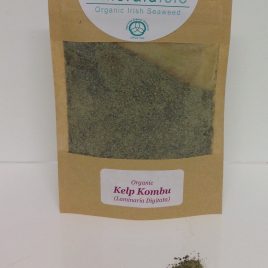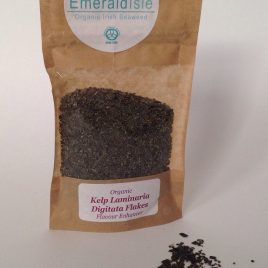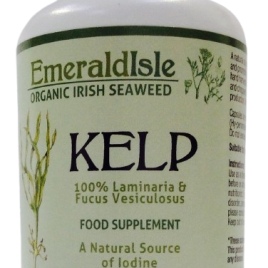Laminaria
Showing 13–15 of 15 results

Organic Kombu Digitata (powder)Flavour enhancer (Copy)
Kelp L. digitata is a tough, leathery, dark brown seaweed that grows to two or three metres. The holdfast which anchors it to the rock is conical and has a number of spreading root-like protrusions called rhizoids. The stipe or stalk is flexible and oval in cross section. The blade is large and shaped like the palm of a hand with a number of more or less regular finger-like segments. This seaweed can be distinguished from the rather similar Laminaria hyperborea by being darker in colour and having a shorter stipe that does not easily snap when bent.
A great way to add seaweed in practically anything savoury you eat.

Protected: Organic Kombu Digitata Granules
Kelp L. digitata is a tough, leathery, dark brown seaweed that grows to two or three metres. The holdfast which anchors it to the rock is conical and has a number of spreading root-like protrusions called rhizoids. The stipe or stalk is flexible and oval in cross section. The blade is large and shaped like the palm of a hand with a number of more or less regular finger-like segments. This seaweed can be distinguished from the rather similar Laminaria hyperborea by being darker in colour and having a shorter stipe that does not easily snap when bent.
A great way to add seaweed in practically anything savoury you eat.

Protected: Kelp Capsules
Kelp Capsules are certified organic by the Irish Organic Farmers and Growers Association.
Kelp capsules seaweed is a completely natural, organic product and a source of over 70 vitamins and minerals (nothing added). We treat our seaweed in an entirely natural way, hand harvested, hand dried and chopped. No chemicals or any other substance is used in production. No microwave, or any harmful process is undertake. “Like all sea vegetables, kelp capsules provides minerals found in sea water, especially iodine and trace minerals that may be leaking in our depleted soils. For Westerners unaccustomed to including seaweed in the diet, a small daily supplement of kelp, in tablet or powdered form is a good idea, but don’t overdo -excess iodine may also cause thyroid problems.” Sally Fallon and Mary G Enig PhD ; Nourishing Traditions Cookbook. Health and nutrition claims from the EU commission.-
Iodine contributes to normal cognitive function.
-
Iodine contributes to normal energy-yielding metabolism.
-
Iodine contributes to normal functioning of the nervous system.
-
Iodine contributes to the maintenance of normal skin.
-
Iodine contributes to the normal production of thyroid hormones and normal thyroid function.
